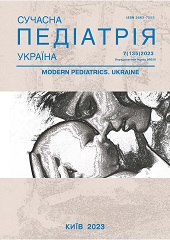Recurrent respiratory infections in young school-age children and psychological maternal predictors
DOI:
https://doi.org/10.15574/SP.2023.135.60Keywords:
recurrent respiratory infections, anxiety, psychological portrait, children, predictorsAbstract
Recurrent respiratory infections (RRIs) in children remain a pertinent issue in modern medicine. According to literary data, the prevalence of this phenomenon can reach up to a quarter of the child population. RRIs adversely affect a child’s physical development, social adaptation, and give rise to intra-family conflicts.
Purpose - to investigate the contribution of psychological predictors from the mother’s perspective in the development of recurrent courses of respiratory infections in their young school-age children.
Materials and methods. The study included surveys of mothers (Spielberger-Hanin State-Trait Anxiety Inventory, the Varga-Stolin Parenting Attitudes Test) and their children (R. Temple, M. Dorki, E. Amen “Choose a face” projective test). The main group comprised children aged 5-7 years with RRIs according to the criteria of the 2021 Inter-Society Consensus. The control group consisted of children aged 5-7 years who experienced occasional acute respiratory infections.
Results. In our study, 40 families (mothers and children) participated. We found that mothers of children with RRIs had significantly higher levels of state and trait anxiety, as well as a higher score in the “Cooperation” parenting attitude model compared to the control group. In the structure of the anxiety phenomenon in mothers of children from the main group, 43% of cases exhibited high anxiety levels. Additionally, a high score in maternal personal anxiety correlated with a predominant choice of ineffective parenting models.
Conclusions. Mothers of children with a RRI have significantly higher levels of situational and personal anxiety (p<0.01). 43% of mothers of children with RRIs exhibit excessively high levels of personal anxiety. Furthermore, more anxious mothers tend to adopt the following parenting models towards their own children: “Little looser”, “Authoritarian hypersocialization” and “Rejection”. The predictive value in the development of RRIs in children is associated with the level of maternal trait anxiety and the psychological portrait of the mother-child relationship, namely the score for by the “Cooperation” model.
Data collection and processing were conducted in accordance with the Helsinki Declaration of the World Medical Association regarding ethical principles in medical research involving human subjects.
The informed consent of patients was obtained for the studies.
No conflict of interests was declared by the authors.
References
Chiappini E, Santamaria F, Marseglia GL, Marchisio P, Galli L, Cutrera R et al. (2021). Prevention of recurrent respiratory infections : Inter-society Consensus. Italian journal of pediatrics. 47(1): 211. https://doi.org/10.1186/s13052-021-01150-0; PMid:34696778 PMCid:PMC8543868
Dennison L, Williamson S, Greenwell K, Handcock M, Bradbury K, Vennik J et al. (2022). Patient perceptions of vulnerability to recurrent respiratory tract infections and prevention strategies: a qualitative study. BMJ open. 12(4): e055565. https://doi.org/10.1136/bmjopen-2021-055565; PMid:35443952 PMCid:PMC9021765
Dorkey M, Amen E. (1947). A continuation study of anxiety reactions in young children by means of a projective technique. Genetic psychology monographs. 35(2): 139-183.
Korhonen LS, Karlsson L, Scheinin NM, Korja R, Tolvanen M, Mertsola J et al. (2019). Prenatal Maternal Psychological Distress and Offspring Risk for Recurrent Respiratory Infections. The Journal of pediatrics. 208: 229-235.e1. https://doi.org/10.1016/j.jpeds.2018.12.050; PMid:30723014
Naurzalina D, Shumeiko T, Almurzayeva B, Tolegenova A, Kubiyeva V. (2015). The impact of family style education on high school student's grades. In Z. Bekirogullari, & M. Y. Minas (Eds.), Cognitive - Social, and Behavioural Sciences - icCSBs 2015, August, vol 6. European Proceedings of Social and Behavioural Sciences: 214-220. Future Academy. https://doi.org/10.15405/epsbs.2015.08.21
Pasternak G, Lewandowicz-Uszyńska A, Królak-Olejnik B. (2020). Recurrent respiratory tract infections in children. Polski merkuriusz lekarski : organ Polskiego Towarzystwa Lekarskiego. 49(286): 260-266.
Roubinov DS, Bush NR, Adler NE, Boyce WT. (2019). Differences in febrile and respiratory illnesses in minority children: The sociodemographic context of restrictive parenting. Academic pediatrics. 19(5): 534-541. https://doi.org/10.1016/j.acap.2018.09.012; PMid:30268425 PMCid:PMC6437018
Sohail A. (2023). Genetic algorithms in the fields of artificial intelligence and data sciences. Annals of Data Science. 10(4): 1007-1018. https://doi.org/10.1007/s40745-021-00354-9
Sukhonos О. (2023). Psycho-corrective measures aimed at normalizing the parental attitude towards children with down syndrome. Men's Health, Gender and Psychosomatic Medicine. 1 (16): 50-57. https://doi.org/10.37321/UJMH.2023.1-06
Vysochyna IL, Kramarchuk VV. (2020). Evidence base for the efficacy and safety of flavonoids and the opinion of outpatient doctors in the focus of choice of approaches to treatment of ARI. Modern Pediatrics. Ukraine. 6(110): 62-69. https://doi.org/10.15574/SP.2020.110.62
Downloads
Published
Issue
Section
License
Copyright (c) 2023 Modern pediatrics. Ukraine

This work is licensed under a Creative Commons Attribution-NonCommercial 4.0 International License.
The policy of the Journal “MODERN PEDIATRICS. UKRAINE” is compatible with the vast majority of funders' of open access and self-archiving policies. The journal provides immediate open access route being convinced that everyone – not only scientists - can benefit from research results, and publishes articles exclusively under open access distribution, with a Creative Commons Attribution-Noncommercial 4.0 international license (СС BY-NC).
Authors transfer the copyright to the Journal “MODERN PEDIATRICS. UKRAINE” when the manuscript is accepted for publication. Authors declare that this manuscript has not been published nor is under simultaneous consideration for publication elsewhere. After publication, the articles become freely available on-line to the public.
Readers have the right to use, distribute, and reproduce articles in any medium, provided the articles and the journal are properly cited.
The use of published materials for commercial purposes is strongly prohibited.

